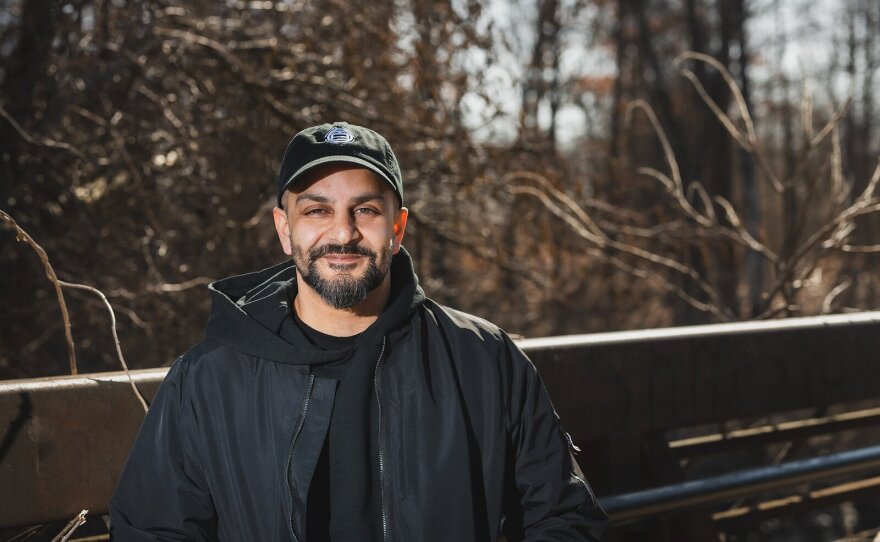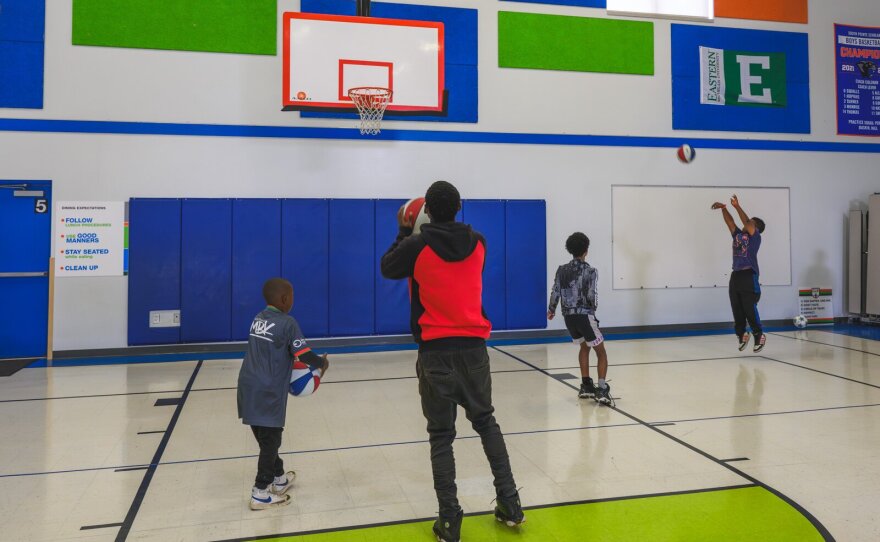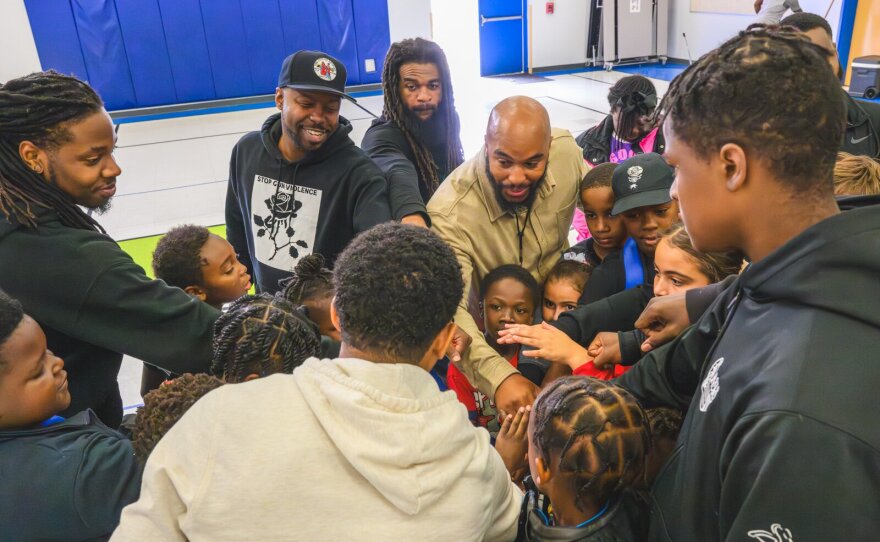Resources:
Sarah Rigg's Feature Article: Youth sports and mental health program spreads from Ypsi-Ann Arbor area to Seattle
CLR Academy 2021 Impact Report
Transcription:
Josh Hakala: You were listening to 89 one WEMU. I'm Josh Hakala, and this is On the Ground Ypsi. It's a program intended to bring you the stories of the Ypsilanti community and we bring you On the Ground Ypsi in partnership with the reporting team at Concentrate Media. And today, we are going to meet the Community Leadership Revolution Academy, or CLR, a youth sports sampling program that is expanding across the Ypsilanti area and outside of all over the country, really. So today, I'm joined by Concentrate Media reporter Rylee Barnsdale, whose online news site is reporting this week on the CLR Academy. Rylee, thanks so much for being with us.
Rylee Barnsdale: Thanks, Josh.
Josh Hakala: And joining us over the phone is Jamall Bufford. He is the director of the Washtenaw County My Brother's Keeper organization, along with the soccer club AFC Ann Arbor. They created the CLR Academy. Thanks so much for being with us.
Jamall Bufford: Thank you for having me.
Josh Hakala: All right, Rylee. Sarah Rigg wrote this story. And tell us about how the CLR Academy got under your radar and why you're talking about them this week.
Rylee Barnsdale: Yes. So, Community Leadership Revolution, CLR Academy, started out in 2020 with co-founders Jamall Bufford and Justin Harper actually bringing some sports equipment over to the Sycamore Meadows Apartments here in Ypsi as a way to create a safe space for kids to get out and play during the height of the COVID pandemic. You know, it was a little bit hard to get kids outside. Everyone was in their homes. And there was also a lot of violence going on around the community. So, families maybe weren't so keen on having their kids running around outside. So, it was really a mission to create these safe spaces for kids to be kids. And now, this mission, which also includes, you know, community building and education and teaching leadership skills, is making its way through throughout the Ann Arbor/Ypsi area and, like you said, even beyond--out into Seattle.
Josh Hakala: Yeah, we'll talk about that expansion and how the program has found its way to the other side of the country in just a bit. But can you tell me a little bit about how the program operates? You mentioned bringing in sports equipment and getting sports involved in their lives, but there's a lot more to it than that.
Rylee Barnsdale: Yeah. So, sports are, you know, not only a great way for kids to get out of the house, to be active, be healthy, but it's also a very wonderful medium to teach things like teamwork and leadership and problem solving. So, the sports side of things that CLR is really just to get kids interested in the program, but they actually get a lot more than just a game and a team to play with. You know, it's really teaching these kids really important life skills while also, you know, developing those nice social skills and things like that.
Josh Hakala: So, Jamall, tell me about My Brother's Keeper and how you got involved with that.
Jamall Bufford: Yeah, My Brother's Keeper is a national initiative that was started by Barack Obama during his presidency. And it's a national initiative. There's over 200 My Brother's Keepers, I believe, across the country. So, I'm the director of the Washtenaw County chapter. They've been active since 2015. Washtenaw was actually one of the first, I believe the first county, to actually sign on as the MBK community. And so, I started coming around about 2018. They asked me to be on the steering committee in 2019, and then a leadership role opened up. And I went out for it and got it. So, I've been in this role for about four years now helping to lead Washtenaw My Brother's Keeper. And, basically, we want to support young Black and Brown men, help conquer some of the barriers that we face, whether it be criminal legal system barriers or educational inequity or economic inequity. So, we're just trying to help with cradle-to-career pathways for young Black and Brown men.
Josh Hakala: And we'll to continue to set the stage for the other side of this partnership: AFC Ann Arbor, a minor league soccer team that competes in the summer and a national league called USL League Two. The club is not only known for the work on the field, but also off the field. Can you tell me a little bit about some of their social justice efforts?
Jamall Bufford: Yeah. So, they have their nonprofit wing called the Mighty Oak Project, and, you know, they are really into initiatives like My Brother's Keeper and supporting in any way they can. And so, when Justin and myself started doing, it wasn't even coffee at the time. It was just Jamall and Justin with some sports equipment. When we started doing that, we reached out to our friend Bilal Saeed, who was then the chair of AFC Ann Arbor, and he was just super into it and wanted to support. So, that's where a lot of our resources and connections and networks came from. And, yeah, it just grew from there.
Josh Hakala: You're listening to On the Ground Ypsi on WEMU. I'm joined by Concentrate Media's Rylee Barnsdale and Jamall Bufford from the Washtenaw County My Brother's Keeper Organization and the Community Leadership Revolution Academy, or C.LR, which is what we are talking about. And I want to know about how the CLR Academy operates. The program, obviously, as I mentioned, focuses on sports sampling, giving kids an opportunity to play and learn various sports. But also, it sounds like sports is just a vehicle to sort of teach kids other things. So, can you give us some examples of that?
Jamall Bufford: For sure, yeah. We went to Sycamore Meadows as a response to no direct community need. And there was some violence happening, and, you know, we wanted the community to know that, you know, you are a community. You are a neighborhood. You have neighbors. You should, you know, feel safe and have respect for the people you live around and want to build with them and connect with them and share ideas and resources with each other. So, that's kind of why we started doing CLR, so young people can feel like they grew up in a loving and caring community. Not to say that that wasn't existing before CLR, but we just wanted to add to it in any way that we could. And so, yeah, it's really about community building, you know, conflict resolution for young people using sports kind of as a way to say, "You know, sometimes you lose. Like, it just happens in life." But, you know, how do you respond to it? How do you bounce back? How do you rebound from it? So, it's using those tools. And then, we also make sure we do some literacy. You know, we bring books, we do reading time, we help them with coping mechanisms when they're dealing with stressful situations. So, we do mindfulness techniques. We bring in yoga instructors. We also talk about nutrition and healthy eating and talk about how sports and being physically active can help you mentally as well. So, we just really want, like, a holistic approach to supporting young people in healthy lifestyles and healthy relationships, like, you know, building friendships and building communities.
Josh Hakala: So, is it sort of similar to maybe what you would see in, like, a summer camp situation where, like, the kids come and spend the day there? How does the whole operation work?
Jamall Bufford: Not the day. We do once a week for an hour and a half. And I would say for the first ten, 15 minutes or so, we do what we call our circle, which is something that I implemented from my background in restorative justice and restorative circles and restorative practice training. So, each session, we start with a circle. Everybody gets in a circle. And we check in with each other and do, you know, little silly icebreakers to get to know each other and just see how we're feeling that day. And then, from there, yeah, depending on the attendance for the day, you know, sometimes it's five, sometimes it's 50, so depending on that, we'll either break up into different groups and rotate through stations, or, if it's a small group, we'll just keep them all together and rotate that way through the stations. Each week, we do basketball, soccer and football. But then, again, like I said, on certain days, we'll bring in different guests, we'll bring in musicians, we'll bring in artists, Curtis Wallace's creative studio does virtual reality headset graffiti writing workshops, so they get to learn how to write graffiti with VR headsets. So, we just try to keep it interesting and entertaining and fun and educational for the young people.
Josh Hakala: So, how do you recruit kids for it? Do they sign up? How do you target the kids that you're trying to reach out to?
Jamall Bufford: Yeah, well, you know, we want to bring access to these types of things in the neighborhoods where they may not be that much access to it. You know, there may be some barriers, whether it be transportation, areas where there may be no grocery store near it, like a food desert. So, we want to bring healthy eating habits to those neighborhoods. So, primarily, yeah, you know, areas where there may not be either sports activities like this or you would have to pay to get sports activities like this. So, that's where we want to take our programming.
Josh Hakala: Well, this is something, I mean, you only started this in 2020. And now, you've already started to export it. You got a CLR academy that has launched in the Seattle area that is also attached to a summer soccer team. Ballard FC, which won the USL League Two national championship this past season.
Jamall Bufford: They certainly did. Yeah. Yeah.
Josh Hakala: How did you inspire this program on the other side of the country? And how is it going?
Jamall Bufford: I believe the story goes Sam Zisette, who used to play for AFC Ann Arbor, moved to Seattle and started it. He's the co-founder of Ballard FC. And I believe on a trip back this way--it may have been an AFC Ann Arbor game, or it may have been a Detroit FC game--but he came back here and caught wind of the work that we were doing with CLR, connected with Bilal and said, "Hey, I would love to do something similar in Seattle with our Ballard FC program." And, thankfully to him and his colleagues, his staff, they didn't want to just see what we're doing in and steal it because they could have easily just said, "Oh, that's cool. We want to do the same thing." But they said, "Hey, we want to partner with you. We essentially want to license what you're doing with CLR and bring it to Seattle. Same model. Same program design." They just had their first summer out there in in a community called White Center.
Josh Hakala: Well, since you're able to export it on the other side of the country, I imagine you probably have plans to do the same thing just here locally in Washtenaw County or in the maybe southeast Michigan area. Is that also in the works?
Jamall Bufford: You know, I would say yeah. It definitely wasn't a plan of mine. It might have been Bilal's plan. Bilal is a marketing and branding genius. So, it might have been in his head the whole time. But me, you know, I just want to help people the best way I can. So, it was never, like, a goal of mine. But now that I see it's possible, like, yeah, why not? Let's take it everywhere.
Josh Hakala: So, this program's only been around for a few years, so you're probably still kind of figuring it out. And, you know, I know you're looking for additional funding.
Jamall Bufford: Yeah.
Josh Hakala: But what do you see as the future for CLR Academy? What do you think it can go?
Jamall Bufford: Well, I mean, yeah, we're still growing. We now have a contract with Superior Township to do CLR all year round. So, it's not just a summer program anymore. We are partnered with Avalon Housing. We were in two of their locations, and we're working on a third Avalon neighborhood. You know, I don't know if I should speak on it too soon, but whatever. You know, we're trying to get to Detroit as well. So, those things are in the works. And, yeah, other cities, other states, other countries, who knows? We're growing. And I think that's the goal. I think that's the plan.
Josh Hakala: All right. Jamall Bufford from the Washtenaw County My Brother's Keeper organization and the CLR Academy and, as always, Rylee Barnsdale from Concentrate Media. Thanks so much for both of you for being with us today on On the Ground Ypsi.
Rylee Barnsdale: Thanks, Josh.
Jamall Bufford: Thank you.
Josh Hakala: If you would like to listen to past episodes of On the Ground Ypsi or if you'd like to listen to an extended version of today's interview, you can find it on our website at WEMU dot org. This is On the Ground Ypsi. I'm Josh Hakala, and this is 89 one WEMU FM Ypsilanti. Public radio from Eastern Michigan University.
Non-commercial, fact based reporting is made possible by your financial support. Make your donation to WEMU today to keep your community NPR station thriving.
Like 89.1 WEMU on Facebook and follow us on Twitter
Contact WEMU News at734.487.3363 or email us at studio@wemu.org















